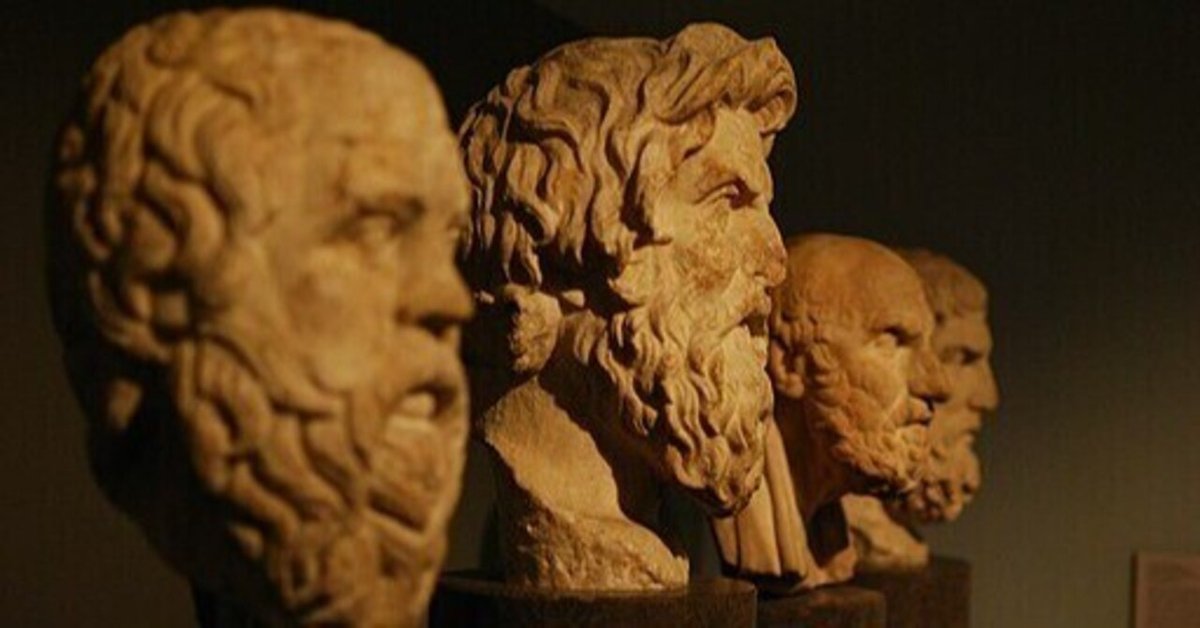
模擬TOEFL iBT003 リスニング問題 - 哲学の起源
また TOEFL iBT の模擬リスニング問題を作ってみた。OGのアリストテレスの幸福論のレクチャーを聞いていて、Listen to part of a lecture in a philosophy class を作るのも面白そうだと感じた。CJの専攻は宗教学 = science of religion、特に宗教社会学や宗教人類学的なものだったので、哲学は専門ではないが、まあ人並み以上の知識はあると思っている。次はルネサンス=古代ギリシャ・ローマの哲学や芸術の復興運動と、そこでイスラム世界が果たした貢献についてレクチャーまたはパッセージでも作ってみようかな。
あと、どうでもいいことだが、今月から新部署に異動となった。まったくもって畑違いの部署で、今学期に受け持っている大学正課授業2コマが終わると、しばらくはティーチング関連には関わらなくなる予定。そして、会社に個人目標として作成した数々の模擬TOEFL iBTコンテンツも上司に引き継いだものの、その上司はさらに上の上司にそれを提出する気はないらしい。ということで、そちらも順次こちらで公開していこうと思う。
Without further ado, enjoy!
Question 01
What is the main topic of the talk?
(A) What should be learned in college to successfully get a job
(B) What caused people to think philosophically about the world
(C) How ancient Greeks rewrote their myth into philosophy
(D) How Thales of Miletus became the first philosopher in western history
Question 02
According to the lecture, what is true of Thales of Miletus?
(A) He led the movement for democratization.
(B) He had a unique interpretation of Greek mythology.
(C) He tried to discover the first principle of the world.
(D) He found arche in the 5th century BCE.
Question 03
According to the professor, what was the beginning of philosophy?
(A) The start of economic decline
(B) The end of political dispute
(C) The start of a new regime
(D) The end of economic relations with other cities
Question 04
Listen again to part of the talk. Then answer the question.
(A) He believes the student misinterpreted what he just said.
(B) He finds that the student is ruminating on the information.
(C) He feels that the student did not pay much attention.
(D) He thinks the student understood correctly.
Question 05
What is the professor expecting of the students through this course?
(A) He wants them to get a good job in the future.
(B) He would like them to be able to think critically.
(C) He needs them to study Thales of Miletus more closely.
(D) He requires them to declare a major in philosophy.
オーディオ・スクリプト
Listen to part of a talk in a philosophy class.
Professor:
Welcome to Philosophy 101. I’m Professor Bates from the Department of Humanities. In this class, you are expected to get a basic understanding of the history of philosophy and how it evolved by examining several well-known philosophers, such as Aristotle, Immanuel Kant, and Martin Heidegger. But before we get started, I wanna ask you. What is philosophy? Where was it born, and when? And most importantly, why?
Female Student:
Professor, I think I read or heard somewhere that philosophy originated in ancient Greece.
Professor:
That’s correct. Do you happen to know when?
Female Student:
I don’t know, like, umm, in the 2nd or 3rd century BCE?
Professor:
Close, but not quite right. OK, so there was this man, Thales of Miletus. He was active in the 6th and 5th centuries BCE. But that is who. My questions were: What is philosophy? And why did it begin?
Female Student:
Ah, I kind of assume that philosophy is to think about the meaning of, umm, everything?
Professor:
Yes. That is actually a very good answer. Philosophers do think about the meaning of practically everything. But the fundamental question is, why do they think about it? What caused people to start thinking about such things in the first place? Let me give you a brief historical overview. Thales of Miletus was the first philosopher in western history. He tried to find what was called arche, which means "the beginning" or "the first principle." Why did he do that? Well, he wanted to understand the world, what it was made of, and how it was made. The 5th century BCE saw the start of democracy. Ancient Greek cities became affluent through trade with other civilizations. They had their own mythology, you know, Greek Mythology. According to it, there were people who were descendants of Greek gods, and they ruled in ancient cities and states. However, with more wealth came the rise of common people. They also learned that other cities and states had their own myths and cultures. What happens when people have knowledge and wealth? They gradually increased their influence and eventually established democracy. What happened, then? Well, they had to seek guidance on how to live on their own, because before democracy, people just followed their king and leaders, as they were representing gods or the descendants of gods. But the days of Greek mythology were now over. They needed to give themselves a new reason for their existence. This is the beginning of philosophy.
Female Student:
So, the start of ancient Greek philosophy had little to do with intellectual or spiritual inspiration but had everything to do with political and economic progress?
Professor:
That’s one way of putting it. Now, think of it this way. You all just started college, which means that you will soon gain more independence and responsibilities both politically and economically. I don’t think all of you are going to be majoring in philosophy, but I really do hope that you develop critical thinking skills in this course, just like ancient Greek people sought and pursued the meaning of this world in a new way. Philosophy might not directly help you secure a job, but it definitely prepares you, as young adults, to venture out into the world. Well, let’s get started.
正答
Question 01 (B)
Question 02 (C)
Question 03 (C)
Question 04 (D)
Question 05 (B)
